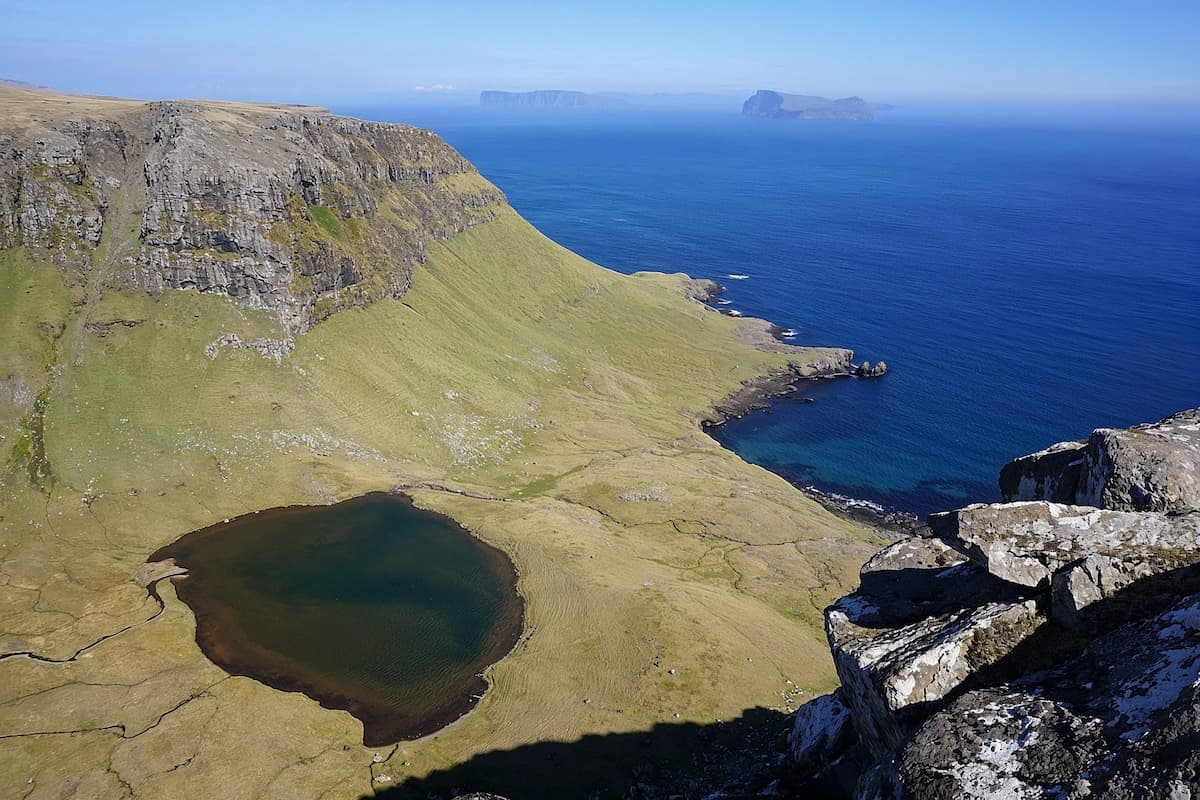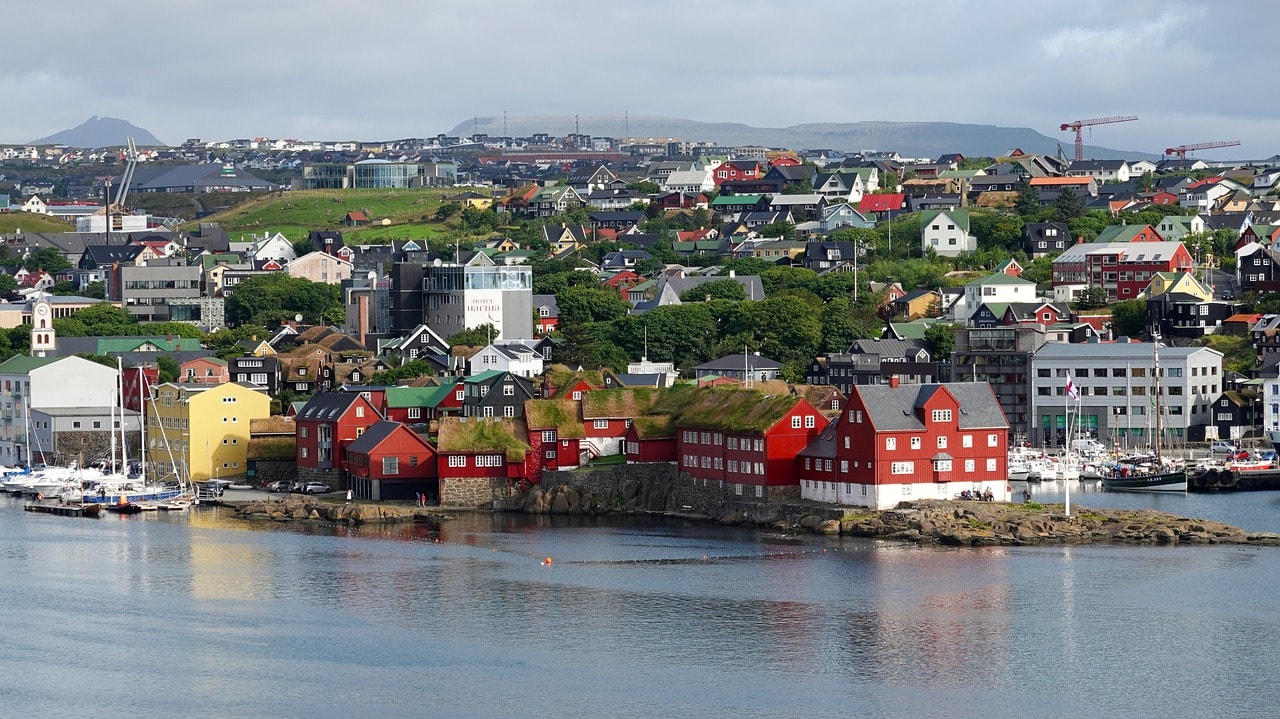The Faroe Islands, an archipelago under the sovereignty of Denmark, lies at the heart of the North Atlantic, geographically situated between Iceland, Norway and Scotland. With a landscape that captivates through its sheer volcanic majesty, the islands are an untouched haven for those seeking the tranquility of rugged nature. The region’s subpolar oceanic climate shapes a unique environment where the terrain soars from the sea, forging a distinctive destination for explorers.
Despite being an intrinsic part of the Kingdom of Denmark, the Faroes maintain a distinctive political identity, with a high degree of self-governance that piques the interest of political enthusiasts and cultural anthropologists alike. The islands’ capital, Tórshavn, is not just a bustling hub but also a repository of Faroese culture and language, encapsulating the spirit of this largely unknown yet significant North Atlantic gem.
Key Takeaways
- The Faroe Islands boast a striking volcanic landscape in the North Atlantic.
- They hold a self-governing status within the Kingdom of Denmark.
- Tórshavn is a cultural focal point, central to the understanding of Faroese identity.
History, Settlement and Politics Of Faroe Islands
The Faroe Islands has a rich tapestry woven from its early days of Irish monks to its enduring connection with the Kingdom of Denmark. It is believed that Irish monks were the Isles’ initial inhabitants in the 6th century AD, before being discovered by the Norsemen.
- Viking Age: The Vikings arrived in the 9th century, dubbing the archipelago ‘the sheep islands’, a name hinting at its pastoral abundance. They quickly established a societal structure deeply influenced by Norse culture.
- Free State: The Norwegian Vikings effectively founded a free state on the islands, setting up a legislature in what is now the capital, Torshavn, which stakes a claim as the site of the world’s oldest parliament.
Political shifts began to occur in the early 19th century when Denmark, which sided with Napoleon, ended up ceding control of Norway to Sweden. Despite this, Denmark retained the Faroe Islands, alongside Greenland and Iceland, which had already been under Danish governance for some time.
The events of World War II brought about significant change. Following Germany’s occupation of Denmark, the Faroe Islands fell under British protection. An independence movement gained momentum, culminating in a 1946 referendum where islanders favoured sovereignty. However, this outcome was not formally accepted by Denmark, leading instead to the establishment of home rule in 1948, which still prescribes the current legal status of the islands.
Denmark‘s monarchy remains the head of state, yet the Faroese people have maintained a distinct identity, retaining their language and culture while navigating their political relationship with Denmark and their place in the broader international community.
The political structure of the Faroe Islands
The Faroe Islands’ political system is a manifestation of parliamentary democracy operating under the Kingdom of Denmark. Granting political autonomy since the Home Rule Act of 1948, the islands govern themselves through a dual monarchy arrangement, maintaining a special jurisdiction apart from Denmark.
- Legislative: The Løgting functions as the unicameral parliament, with representation from multiple political parties. Key ones include the Progress, Republic, and Social Democratic Party. Legislative elections determine the party composition, instrumental in shaping the government.
- Executive: At the helm of the executive power is the Prime Minister, leadership vested in the majority party’s leader. Supporting the executive structure are the Queen of Denmark, who appoints the High Commissioner, and the Faroese cabinet, known as the Landsstýri.
- Judiciary: A check-and-balance system is established via an independent judiciary, ensuring governance adherence to democratic principles.
- Municipal Relations: Local government is spread across various municipalities, each playing a role in the island’s administrative affairs.
- International Representation: The islands maintain diplomatic representatives in significant global locations like Moscow, Copenhagen, London, Reykjavik, and the European Union.
Facilitating a royal trade monopoly in history, today’s Faroese political landscape is one where home rule coexists with responsibilities to the Danish monarchy, expressed through the High Commissioner and broader foreign policy coordination.
Culture and language of Faroe Islands
The Faroe Islands are steeped in a unique blend of cultural heritage and art, where traditions seamlessly merge with contemporary innovation. Amidst its fjords and picturesque landscapes, a distinct language, Faroese, is spoken, cementing the nation’s identity. This language is a direct descendant of Old Norse, brought by Norwegian Vikings and retaining a linguistic kinship with present-day Icelandic.
- Capital & Government: Tórshavn serves as the capital, where one can find the ancient Tinganes legislature. Whilst under Danish sovereignty, the Islands enjoy extensive autonomy and have their own government.
- Economy: Traditionally, the fishing industry has been the lifeblood, still vital today due to the aquaculture and commercial fishing industry. Economic strategies now aim for diversification to support population growth and sustainable nation-building.
- Culture & History: Cultural vibrancy is reflected in its literature and art, with historical connections dating back to Norwegian kings and the Reformation. The heritage is preserved and celebrated in cultural institutions and everyday life.
- International Relations: As citizens of the Faroes, people engage in referendum processes and are part of the Nordic Council. The Islands maintain a coalition government, aligning with the Scandinavian welfare state model.
Evocative of their strong Christianity roots and rich maritime history, the Faroese fish products remain a symbol of their enduring resilience and a connection to the Atlantic Ocean, neighbouring Scotland, Greenland, and distant shores like Germany and London.
Frequently Asked Questions
What significant events have shaped the history of the Faroe Islands?
The Faroe Islands have a rich history dating back to the early medieval period when they were settled by Norsemen. The timeline below highlights some key events:
- 9th century: Norse settlement and establishment of the Althing, one of the oldest parliaments.
- 1035: The islands became part of the Kingdom of Norway.
- 1380: Norway entered into a union with Denmark. Faroe Islands came under Danish control.
- 1940-1945: British occupation during World War II, bolstering the Faroese autonomy movement.
- 1948: Home rule established, granting the Faroe Islands self-governance over domestic affairs.
This book tells the remarkable story of Faroese cultural and political history.
How has Faroese culture been influenced by its history and geography?
Faroese culture is deeply intertwined with its Nordic history and rugged maritime geography. Notable influences include:
- Nordic mythology and lore: Folk tales and traditional songs are passed on through generations.
- Seafaring tradition: Fishing has shaped the socio-economic structure of island society.
Place and identity in the Faroe Islands provides insights into these cultural aspects.
What are the primary political ideologies that have emerged in the Faroe Islands?
Political life in the Faroe Islands is characterised by a spectrum of ideologies:
- Autonomy: A strong sentiment for maintaining and expanding self-rule.
- Independence: A movement advocating for full sovereignty from Denmark.
Examine how The Faroe Islands: options for independence discusses these ideologies.
Who have been the prominent leaders in Faroese political history?
Several leaders have made significant contributions to Faroese politics:
- Jóannes Patursson: Early advocate for Faroese independence.
- Andrass Samuelsen: First Prime Minister of the Faroe Islands.
What languages are spoken in the Faroe Islands, and what are their origins?
In the Faroe Islands, two primary languages are spoken:
- Faroese: a West Nordic language derived from Old Norse, is the principal language.
- Danish: widely understood, as it’s a mandatory subject in schools.
How does the demographic composition of the Faroe Islands affect its culture?
The population is predominantly of Nordic and Scottish descent. Essential points include:
- Homogeneity: Cultural uniformity due to minimal immigration.
- Diaspora: Faroese abroad influence cultural exchange and diversity.
Despite the small population, there is a remarkable story of the Faroes’ cultural resilience and identity.

